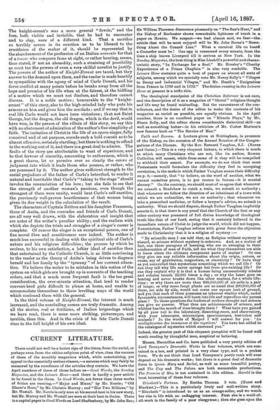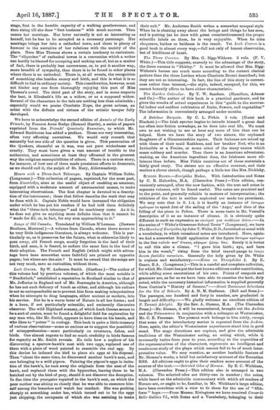Elizabeth's Fortune. By Bertha Thomas. 3 vols. (Horst and Blackett.)—This
is a particularly lively and well-written story. "Elizabeth" is introduced to us as an orange-seller, and we watch her rise in life with an unflagging interest. First she is a maid-of. all.work in the family of a poor clergyman ; then she goes upon the
stage, first in the humble capacity of a walking gentlewoman, and then rising till she does "first business" with much success. Then comes her marriage. Her lover naturally is not so interesting as herself, hat he has to be accepted as a necessary personage. Her marriage brings her into a cathedral town, and there is plenty of humour in the narrative of her relations with the society of the place. Here Miss Thomas shows a certain tendency to caricature. The "cliqueism" of cathedral towns is a convention which a writer can hardly be blamed for accepting and making use of, but as a matter of fact, there is probably leas narrowness, or, to put it another way, more breadth of sympathy, than there is to be found in other places where there is no cathedral. There is, at all events, the recognition of something else besides money and birth, and this is what it is no difficult to find in ordinary society. This conaideration, however, most not hinder any one from thoroughly enjoying this part of Miss Thomas's novel. The third part of the story, and in some respects the best, is Elizabeth's life as a widow, or as a supposed widow. Several of the characters in the tale are nothing less than admirable ; especially would we pride° Charlotte Hope, the great actress, an artist with the defects and virtues of the artistic' temper fully developed.
We have to acknowledge the second edition of Annals of the Early Friends, by Frances Anne Badge (Samuel Harris), a series of papers reprinted from the Friends' Quarterly Ereaminer, to which Mr. Edward Baokhouse has added a preface. These are very interesting, often very affecting narratives. We would only remark that naturally but one side of the question is given. This persecution of the Quakers, shameful as it was, was not pure wickedness and cruelty. They mast have given a vast amount of trouble to the authorities, and sometimes at least they affronted in the grossest way the religious susceptibilities of others. There is a curious story, for instance, of how one of them made persistent efforta to desecrate, as we should call it, the pulpit of St. Mary, Aldermanbury.



































 Previous page
Previous page